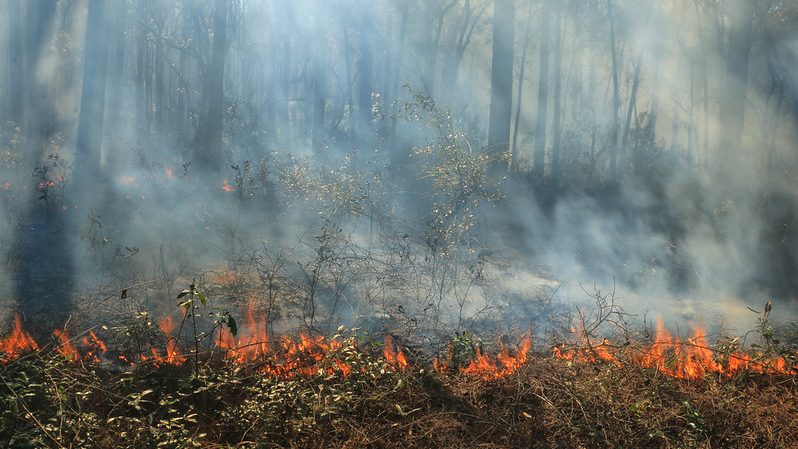USGS and CASC Network Advance Wildland Fire Research Efforts

The U.S. Geological Survey has released a new Wildland Fire Science Strategic Plan outlining their wildland fire strategy for the next five years (2021-2026), U.S. Geological Survey Wildland Fire Science Strategic Plan, 2021–26. Additionally, a fact sheet was created to summarize the goals of USGS in supporting wildland fire research, Wildland Fire Science—Supporting Wildland Fire and Land Management. This strategic plan intends to guide future USGS research in the field while providing relevant information for land managers to address fire risk before, during, and after a wildfire event.
The strategic plan is aligned with the needs outlined by the wildland fire science stakeholder community which includes fire, land, natural resource, and emergency managers from Federal, State, Tribal, and community organizations, as well as members of the broad scientific community. Four main priorities were identified and make up the structure of the plan. These priorities include:
- Priority 1: Produce state-of-the-art, actionable fire science – Provide scientific analyses, data, and tools that inform current and future fire and land management decision making and promote understanding of fire-related and fire responsive earth system processes and patterns.
- Priority 2: Engage stakeholders in science production and science delivery – Use a science co-production approach throughout the fire research life cycle to develop and maintain collaborations with stakeholders who are actively and continually engaged. This ensures that USGS research platforms and science products are relevant and useful for fire and land management decision making.
- Priority 3: Effectively communicate USGS fire science capacity, products, and information to a broad audience – Strategically manage communications to effectively build awareness of and access to USGS wildland fire science among key external and internal stakeholders.
- Priority 4: Enhance USGS organizational structure and advance support for fire science – Provide organizational structure and support that improves fire science production, coordination, and cooperation within the USGS and with external partners.
A current effort of the Southeast CASC, along with National and other regional CASCs, to support and advance these USGS wildland fire priorities is the Future of Fire: Towards a National Synthesis of Wildland Fire Under a Changing Climate project. Each CASC will support a postdoctoral student who will undertake regionally-relevant research on climate-fire dynamics and participate in professional development trainings through the Climate Adaptation Postdoctoral Fellows program. Southeast CASC intends to support future research on climate and land use impacts on prescribed burning.
The strategic plan and supporting documents in companion files to the plan document draw on science undertaken by SE CASC researchers, for example:
- Vital Futures: Conservation Adaptation Planning for Landscape and Climate Change in the Southeast
- New SE CASC Research Gives Insight Into Prescribed Fire Windows for Future Forests
- SE CASC & South Atlantic Spring/Summer Science Series presentation: Perspectives on Prescribed Fire Management in Longleaf Pine Ecosystems
Full citation
Paul F. Steblein, Rachel A. Loehman, Mark P. Miller, Joseph R. Holomuzki, Suzanna C. Soileau, Matthew L. Brooks, Mia Drane-Maury, Hannah M. Hamilton Jason W. Kean, Jon E. Keeley, Robert R. Mason, Jr., Alexa McKerrow, James R. Meldrum, Edmund B. Molder, Sheila F. Murphy, Birgit Peterson, Geoffrey S. Plumlee, Douglas J. Shinneman, Phillip J. van Mantgem, and Alison York, 2021, U.S. Geological Survey wildland fire science strategic plan, 2021–26: U.S. Geological Survey Circular 1471, 30 p., https://doi.org/10.3133/cir1471.
- Categories:
